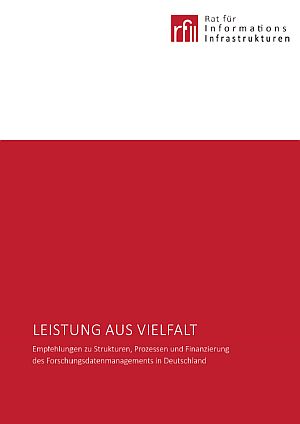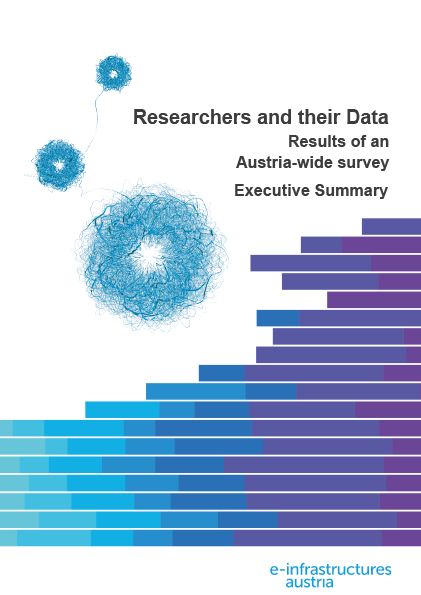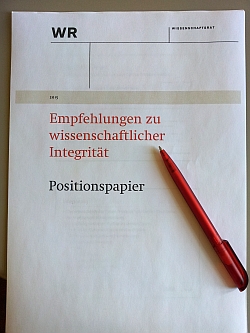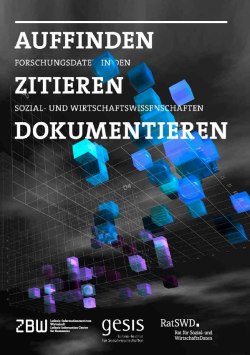Posted: April 26th, 2017 | Author: Sven | Filed under: found on the net, German, Opinion | Tags: Replication, reproducibility | Comments Off on German Research Foundation (DFG) publishes Statement on Replicability
 The German Research Foundation (DFG) has currently released a statement on the replicability of research results.
The German Research Foundation (DFG) has currently released a statement on the replicability of research results.
Interestingly (at least for me), the five-pager first starts with a broader definition of what replicable research is NOT.
Of course, replication is a very important method for testing empirical knowledge claims based on experimental and quantitative research in medicine, the natural, life, engineering, social and behavioural sciences, as well as the humanities.
But, according to DFG, there are limitations:
- Replicability is not a universal criterion for scientific knowledge.
- Ascertaining the replicability or non-replicability of a scientific result is itself a scientific result. As such, it is not final but subject to methodological scepticism and further investigation.
- Non-replicability is not a universal proof by falsification.
- Non-replicability is not a universal indicator of poor science.
‘Well, an unorthodox starting point for a paper on reproducible research‘ – so, at least, were my thoughts when I read the first page of the statement. Wouldn’t it be more common to first depict the important aspects of reproducible research and to suggest measures to support it, instead of rowing back at the beginning of such a statement? Read the rest of this entry »
Posted: July 21st, 2016 | Author: Sven | Filed under: German, Projects, Research Data | Tags: infrastructure, network | Comments Off on New countrywide RD-INF Project approved: Generic Research Data Infrastructure (GeRDI) ready to get off the starting blocks
 In my previous post, I presented some analyses and recommendations the RfII (German Council for Scientific Information Infrastructures) made for the future development and structuring of the German national landscape on research data management. For instance, the RfII found, that
In my previous post, I presented some analyses and recommendations the RfII (German Council for Scientific Information Infrastructures) made for the future development and structuring of the German national landscape on research data management. For instance, the RfII found, that
‘there is an overall absence of coordination, and current efforts often take the form of parallel, project-based initiatives. Universal access to services for data management is lacking, as the key actors at present are individual institutions and organisations, and their efforts often suffer from limited financing and/or excessive niche focus. In addition, the high staff turnover means that valuable know-how is frequently lost. Furthermore, the range of services being provided is impaired by the absence of governance mechanisms which could impart greater strategic direction.’
Currently, when scientists generate research data often the question arises where to store the data. Currently, only a handful of universities already have an appropriate infrastructure in place while for the big majority such a research data infrastructure is still missing.
Also from the perspective of a researcher who is looking for (reusing) data already available, the current state is unsatisfactory: The few research data infrastructures currently available at German universities, but also other research data centres from different subjects, are hardly linked with other data repositories and often remain data silos. Read the rest of this entry »
Posted: July 19th, 2016 | Author: Sven | Filed under: German, Report, Research Data | Tags: funding, recommendations | Comments Off on ‘Council for Scientific Information Infrastructures’ publishes recommendations on RDM structures and processes
 In June, the German Council for Scientific Information Infrastructures (RfII) has published some recommendations on determinats of future research data management and the development of corresponding infrastructures.
In June, the German Council for Scientific Information Infrastructures (RfII) has published some recommendations on determinats of future research data management and the development of corresponding infrastructures.
Because I believe that these recommendations are also of broader interest to our readers, I would like to highlight some of recommendations of the report.
But first of a all, some introductory words on the RfII: The German Council for Scientific Information Infrastructures was established in November 2014. The 24 members work in an honorary capacity and were appointed by the Joint Science Conference of the Federal States and the Federal Government of Germany for a service period of four years. The Rfll was tasked by Germany’s Joint Science Conference (GWK) with formulating broad-based recommendations for the science system in Germany as a whole.
Consequently, the recommendations presented in the report have ramifications for a variety of actors in the domains of politics and science. The Rfll is convinced that the adoption of new ways in dealing with research data as well as long-term preservation and accessibility will be a significant, common challenge for all actors in the years ahead. Read the rest of this entry »
Posted: December 1st, 2015 | Author: Sven | Filed under: German, Projects, Report, Research Data | Tags: Austria, infrastructure | Comments Off on Austria: New report “Researchers and their Data” published
 A solid research data management system is the foundation of cooperative, open research. In addition such a system fosters reproducibility and verifiability of research.
A solid research data management system is the foundation of cooperative, open research. In addition such a system fosters reproducibility and verifiability of research.
This topic is relevant and up-to-date for researchers, funding bodies and senior posts of scientific institutions, which is currently also underpinned by the pilot for research data of the European Commission.
In this context, the project e-Infrastructures Austria has just released a report that provides an overview of an Austria-wide survey on research data. The survey was carried out at the beginning of 2015. It was directed at the scientific and artistic-scientific personnel of all 21 public universities and three extramural research institutions in Austria.
The project received 3026 completed questionnaires, which is equivalent to an average response rate of 9 %. Read the rest of this entry »
Posted: April 28th, 2015 | Author: Sven | Filed under: German, journals, Opinion, Report | Tags: ethics, German Council of Science and Humanities | Comments Off on German Council of Science and Humanities publishes Recommendations on Scientific Integrity
Yeste rday, the German council of Science and Humanities (Wissenschaftsrat) published a 54-page position paper on scientific integrity (unfortunately in German only). In a press release the scientific body stated:
rday, the German council of Science and Humanities (Wissenschaftsrat) published a 54-page position paper on scientific integrity (unfortunately in German only). In a press release the scientific body stated:
“Prosperity and development of modern societies today depend to a large extent on the quality and progress of scientific knowledge. Therefore it is important that the public can trust in the ethical and quality standards of the scientific community. Cases of fraud and misconduct – particularly major fraud and plagiarism scandals – undermine that trust. In response to such cases of fraud and loss of confidence many scientific organisations have published rules and guidelines dedicated to a Good Scientific Practice in the last few years. The German council of Science and Humanities now has adopted a position paper and recommendations on scientific integrity.” Read the rest of this entry »
Posted: March 20th, 2015 | Author: Sven | Filed under: found on the net, German | Tags: Position Paper, recommendations | Comments Off on “Research Data at your Fingertips”: German Priority Initiative ‘Digital Information’ publishes Position Paper
 The Priority Initiative Digital Information of the Alliance of German Science Organisations has published a position paper on research data and research data infrastructures in February.
The Priority Initiative Digital Information of the Alliance of German Science Organisations has published a position paper on research data and research data infrastructures in February.
At the beginning the four page long paper sketches a short vision on how researchers will be able to work with research data in the year 2025. A “quick and easy access to all research data” is part of this vision, also the important task to credit researchers for sharing their research data is mentioned by the authors: “The publication of research data and software enhances the academic reputation.”
The second chapter of the paper deals with the current challenges in managing research data. Especially the situation in organisational structures, different research disciplines, publicly funded information institutions and research organisations is described. Read the rest of this entry »
Posted: September 18th, 2014 | Author: Sven | Filed under: EDaWaX, German, Research Data | Tags: data citation, data documentation, data sources, Guidebook, persistent identifiers | Comments Off on Guidebook “Discover-Cite-Document: Research Data in the Social Sciences and Economics” published
 After almost eight months of intense collaborative work, we are happy to announce the release of a guidebook on research data in the social sciences and economics. The idea of writing the guidebook was born in the course of a panel session on last year’s annual meeting of the “Verein für Socialpolitik” (VfS), the largest German-speaking economists association, where Jutta Günther (Halle Institute for Economic Research), Klaus Tochtermann (ZBW), Gert G. Wagner (German Data Forum and DIW Berlin) and Stefan Winkler-Nees (German Research Foundation) discussed both the potential and the need of data sharing in applied economics.
After almost eight months of intense collaborative work, we are happy to announce the release of a guidebook on research data in the social sciences and economics. The idea of writing the guidebook was born in the course of a panel session on last year’s annual meeting of the “Verein für Socialpolitik” (VfS), the largest German-speaking economists association, where Jutta Günther (Halle Institute for Economic Research), Klaus Tochtermann (ZBW), Gert G. Wagner (German Data Forum and DIW Berlin) and Stefan Winkler-Nees (German Research Foundation) discussed both the potential and the need of data sharing in applied economics.
The panellists assessed that there currently is a lack of information on data documentation and citation in academic education.
Consequently, together with our partners from DIW Berlin, GESIS and the German Data Forum, we started to gather information on these topics. One year after the initial panel discussion, the hot off the press booklet was presented at this year’s annual meeting of the Verein für Socialpolitik two weeks ago.
Read the rest of this entry »
Posted: July 23rd, 2013 | Author: Sven | Filed under: found on the net, German, Report | Tags: infrastructure, Research Data | 1 Comment »
 The German project RADIESCHEN / radish (Rahmenbedingungen einer disziplinübergreifenden Forschungsdateninfrastruktur /Framework for an inter-disciplinary research data infrastructure) has published the project’s synthesis in English. The objective of this DFG-funded project was the development of a roadmap and recommendations for a multi-disciplinary research data infrastructure in Germany.
The German project RADIESCHEN / radish (Rahmenbedingungen einer disziplinübergreifenden Forschungsdateninfrastruktur /Framework for an inter-disciplinary research data infrastructure) has published the project’s synthesis in English. The objective of this DFG-funded project was the development of a roadmap and recommendations for a multi-disciplinary research data infrastructure in Germany.
The project team identified requirements for generic components of existing infrastructures and potential for cross-linking of multi-disciplinary components. The resulting analysis is based on a survey of existing and new projects and includes measures for community building. Key aspects of the analysis are the technical components of the infrastructure, the cost model and the investigation of cross-disciplinary topics.
Photo: “Lachdieschen” by dwarslöper / flickr.com. License: CC-BY-NC-SA 2.0 DE
Posted: January 17th, 2012 | Author: Sven | Filed under: EDaWaX, German | Tags: Description, Dissemination | Comments Off on RatSWD-Newsletter: EDaWaX Project introduced
The German Data Forum (RatSWD) has ju st published its current newsletter. Beside many other interesting articles, book reviews, event notes etc., on page 3 a description of the EDaWaX-Project is included (see below).
st published its current newsletter. Beside many other interesting articles, book reviews, event notes etc., on page 3 a description of the EDaWaX-Project is included (see below).
I’m sorry for our international visitors, but the article and the whole newsletter is available in German only.
Additionally I want to point the attention of our readers to another publication (in German) of the German Data Forum: Prof. Gerd G. Wagner and D. Huschka published a comment on the nature magazine’s special issue “data replication and reproducibility.”
You’ll find the working paper 194 “Datenverfügbarkeit reicht nicht, um Replikationsstudien zur Routine zu machen” in the Download section of this blog or on the website of the German Data Forum.
Read the rest of this entry »
Posted: October 20th, 2011 | Author: Sven | Filed under: German, Report, Research Data | Tags: RDM, Training | Comments Off on Reference Book “Research Data Management” published
 In the course of Frankfurt Book Fair, a new reference book for reasearch data managenent was announced.
In the course of Frankfurt Book Fair, a new reference book for reasearch data managenent was announced.
The reference book, published by Prof. Büttner, Prof. Hobohm (both FH Potsdam) and Lars Müller, gains insights in the management of research data in different scientific communities.
Beside other topics the reference book deals with the lifecycle of research data, data policies, judical subjects, metadata and standards, repositories for research data, digital preservation and the publishing of data.
The refence book is published by Bock and Herchen and additionally is available as open acess publication.
You can download the reference book here.
 The German Research Foundation (DFG) has currently released a statement on the replicability of research results.
The German Research Foundation (DFG) has currently released a statement on the replicability of research results.
 In my previous post, I presented some analyses and recommendations the
In my previous post, I presented some analyses and recommendations the  In June, the German Council for Scientific Information Infrastructures (
In June, the German Council for Scientific Information Infrastructures ( A solid research data management system is the foundation of cooperative, open research. In addition such a system fosters reproducibility and verifiability of research.
A solid research data management system is the foundation of cooperative, open research. In addition such a system fosters reproducibility and verifiability of research. rday, the German council of Science and Humanities (Wissenschaftsrat) published a 54-page position paper on scientific integrity (unfortunately in German only). In a press release the scientific body stated:
rday, the German council of Science and Humanities (Wissenschaftsrat) published a 54-page position paper on scientific integrity (unfortunately in German only). In a press release the scientific body stated: The
The 
 The German project
The German project 
 In the course of Frankfurt Book Fair, a new reference book for reasearch data managenent was announced.
In the course of Frankfurt Book Fair, a new reference book for reasearch data managenent was announced.





